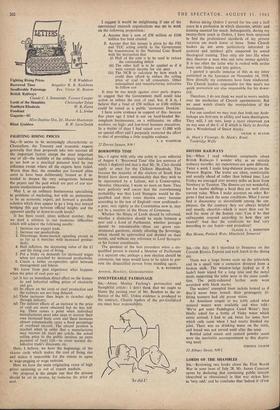Fighting Rising Prices T. B. Waddicor Borrowed Time Brigadier R.
B. Rathbone Insufferable Patronage Rev. Victor H. Beaton British Railways Claude C. J. Simmonds, Terence Cooper Lords of the Shambles Christopher Sykes Southern Rhodesia W. R. Ferris Foodcast A. L. Irvine Gagarin—Si!
Miss Daphne Slee, Dr. Murdo Mackenzie Blind Goddess R. W. Sporv:Smith FIGHTING RISING PRICES SIR,—It seems to be increasingly characteristic of Chancellors, the Treasury and economic experts generally that their proposals take into account all the important factors except the most important one of all—the inability of the ordinary individual to see how at a practical personal level he can influence events where all the experts have failed. Worse than that, the remedies put forward often seem to have been deliberately framed as if in- tended to deepen the very antagonisms between the payers and the paid which are part of our eco- nomic readjustment problem.
May I, as an ordinary businessman specialising in problems of marketing, but with no pretensions to be an economic expert, put forward a possible solution which does appear to go a long way toward bridging this gap between official heights and the apparent apathy at down-to-earth levels?
It has been stated, times without number, that we need a solution to our economic difficulties which will achieve the following results : 1. Increase our export trade.
2. Increase our productivity. 3. Discourage home-market spending except in so far as it marches with increased produc- tivity.
4. Halt inflation, the decreasing value of the £1 and the rising cost of living.
5. Put a brake on demands for increased wages when not matched by increased productivity. 6. Create a better co-operative spirit between management and labour.
We know from past experience what happens when the price of coal goes up: (a) It has an immediate direct effect on the domes- tic and industrial selling prices of electricity and gas.
(6) Its effects on the costs of steel production and the railways are not long delayed.
(c) These increases then begin to ricochet right through industry. (d) The indirect effects of an increase in the price of coal are more obscured but no less tell- ing. There comes a point when individual manufacturers must take steps to recover their own increased basic costs and these increases almost automatically carry a fixed percentage of overhead on-cost. The absurd position is reached when in order that a manufacturer may recover 4d. (say) per article, the actual selling price to the public involves an extra payment of (say) lid.—to cover normal dis- tributive trade's discounts, etc.
Here, I believe, we have the beginnings of the vicious cycle which makes the cost of living rise and makes it impossible for the unions to agree to wage-pegging or wage restraint.
Here we have the main originating cause of high prices squeezing us out of export markets.
My proposal is the simple one that the process should be set in reverse, by reducing the price of coal. I suggest It would be enlightening if one of the operational research organisations was set to work on the following proposition: A. Assume that a sum of £50 million or £100 million has been created.
B. Assume that this money is given by the FBI and TUC acting jointly to the Government for transmission to the National Coal Board with the instruction that (i) Half of the sum is to be used to reduce the outstanding deficit (ii) The other half is to be applied as if it were current income for one year.
(iii) The NCB to calculate by how much it could then afford to reduce the selling price of coal to all consumers. Other nationalised and manufacturing industries to follow suit It may be too much against strict party dogma to suggest that the Government itself could take action to reduce the cost of coal, but, if it is, 1 believe that a fund of £50 million or £100 million could be raised as a public 'economic Dunkirk.'
I have some evidence in support of this. because five years ago I tried it out on hard-headed Bir- mingham businessmen, on a millionaire, on office workers, on high- and low-level business executives. In a matter of days I had raised over £1,000 with no special effort and I purposely restricted the effort to that of providing a little tangible evidence.
T. B. WADDICOR






























 Previous page
Previous page